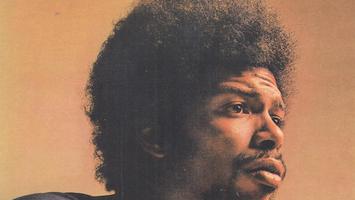The vulnerability of Black men and boys in the U.S. counters the narrative that they inherently seek to emulate the dominance and plunder of white men over women so characteristic of imperial patriarchy.
“Our understandings of gender have been infected by the lust for Black male disposability within white society and its institutions.”
The Man-Not: Race, Class, Genre and the Dilemmas of Black Manhoodattempts to theorize Black male existence beyond the erasure, hatred, and malice that Black men and boys face in the United States. In doing so, Tommy Curry challenges academia and much of what calls itself the left. Over the last several decades, theories that position Black men as masculinist and oppressive have dominated gender discourses. Even worse, Curry notes that gender theory has reinforced stereotypes about Black men and condemned their expressions of masculinity as inherently toxic, violent, and worthy of punishment. White masculinities, on the other hand, have been discussed as varied and complex. This book intervenes in the U.S. empire’s erasure of Black men and boys by envisioning a genre of study that centers their experience and their humanity.
“Gender theory has reinforced stereotypes about Black men and condemned their expressions of masculinity as inherently toxic, violent, and worthy of punishment.”
To lay out this vision, Curry equally engages academic scholarship and literature from the Black struggle against empire to challenge the claim of Black male privilege. The book devotes a chapter to Eldridge Cleaver’s Soul on Iceand The Book of Livesto demonstrate that Black men within the prison of Jim Crow and the New Jim Crow are sexually assaulted to serve the needs of white male and female power. Curry uncovers how assertions of the Black male desire to mimic patriarchy fail to meet the test of empirical fact. The vulnerability of Black men and boys in the U.S. counters the narrative that they inherently seek to emulate the dominance and plunder of white men over women so characteristic of imperial patriarchy. In fact, Curry shows that Black men possess more progressive attitudes around gender than white men and white women.
Yet this book does not seek to “prove” the worth of Black men but instead offers a new theory of Black manhood that delegitimizes the notion that patriarchy forms a basis of privilege rather than vulnerability for Black men and boys. Anti-Black male sentiment, defined in the book as racist misandry, has animated the U.S. social order since its inception. Black men and boys have been killed at high rates to serve the interests of the white colonial and imperialist empire of the United States. To justify the killing, Black men and boys have been defined as bodies rather than humans. These bodies have further been targeted as problems that are both desired and condemned.
“This book offers a new theory of Black manhood that delegitimizes the notion that patriarchy forms a basis of privilege rather than vulnerability for Black men and boys.”
The Man-Not is as rich in historical data as it is in theoretical analysis. Curry traces the transformation of Black men into “man-nots” to the roots of the U.S. capitalist slave system where Black men were defined as brutes and rapists to justify their condition of unfreedom. White women have played a critical role in this regard. Many early feminists the United States such as Elizabeth Cady Stanton saw their activism as a project of protecting white womanhood from the Black male rapist.White feminism has thus been a weapon of innocence employed to kill Black men. As Curry explains,
“By casting the primitive Black male as their natural enemy, feminists of the nineteenth century provided ideological fuel to the murderous lust white men expressed toward Black male bodies. The primal rapist inverted the male-female hierarchy and confined Black men to the modality of the slave, even after emancipation. In other words, the myth of the Black rapist allowed white women to exercise their sexual power over Black men through illicit sexual relations and rape and to further white men’s justification to murder and lynch Black men in an attempt to garner political power and deny political rights to Blacks in the United States (p.59).”
“Many early feminists the United States such as Elizabeth Cady Stanton saw their activism as a project of protecting white womanhood from the Black male rapist.”
Under the current regime of U.S. empire, the lynching of Black men and boys takes on several forms. We learn, most of us for the first time, that Black men and boys suffer from high rates of intimate partner violence (IPV) and rape (although it is rarely defined as such). We learn that Black men and boys are the victims of a “political economy of Niggerdom” and the high rates of police violence, incarceration, unemployment, and premature death that comes with it. Understanding these conditions ensures that readers see Black men and boys not as things or problems, but as vulnerable humans. Furthermore, the lynching of Black men and boys possesses a sexual character that requires us to view their oppression as not merely a race problem but a problem of the relationship between Black manhood and U.S. imperialism and patriarchy.
Thus, The Man-Not does not simply outline the ills of Black men and boys. Rather, it shows how the systematic erasure and dehumanization prevents Black men and boys from achieving patriarchal dominance under the U.S. imperial regime. This book further reminds us that Black men and boys are, and should be, active agents of their own history and struggle for freedom. Feminists and theorists of all disciplines are criticized for their silence on racist misandryand its role in not only reinforcing the special violence experienced by Black men but also the pleasure that is derived from it. The Man-Not helps us move beyond viewing Black men as a problem and toward the need to acknowledge their central role in the struggle for freedom which lies beyond the death that marks their lives under U.S. imperialism.
“Feminists and theorists of all disciplines are criticized for their silence on racist misandry.”
The most critical aspect of this book is its application to political reality. Biological essentialism has justified a conservative brand of gender politics in the academy that places the relations of white power, class, empire and their relationship to patriarchy beyond the realm of acceptable discussion. Patriarchy is theorized as race-neutral, leaving what Curry describes as outgroup males in the category of “privileged” for their perceived potential to rape, to assault, and to “take up space.” Black men and boys are once again positioned as a threat and systematically excluded from academia. This has especially taken hold since affirmative action was gutted in place of the con of diversity, the mass de-Blackening of higher education as a means of keeping unruly and revolutionary ideas out of the American university system.
I have spent the last year studying solitary confinement as a form of torture particularly designed for Black men in the U.S. Forty-five percent of the 80-100,000 prisoners in solitary confinement in the U.S. are Black men.Dozens of Black men in prison, many of whom have spent decades in solitary confinement, are there primarily for political reasons. While we of course cannot say that Black men are the onlygroup subject to solitary confinement or political incarceration, we can be confident through an analysis of history that the weapons of incarceration and solitary confinement have been employed mainly against Black men for a very good reason: the protection of white power and property and the founding mythology that Black men are rapists, murders, and brutes in need of enslavement and punishment. Entire programs exist to teach Black male prisoners that “toxic masculinity”is the primary reason for the violence and incarceration leveled against them. Again, it is Black men who are the problem, not the system. Few see Black men as outgroup males whose oppressed condition within colonial and imperial contexts ensures not only their continued premature death, but also the reification of a global system of empire which requires their corpses.
“Entire programs exist to teach Black male prisoners that ‘toxic masculinity’ is the primary reason for the violence and incarceration leveled against them.”
We at Black Agenda Report are most concerned with how scholarship can serve the exact opposite purpose. Scholarship should be evaluated for its service to the struggle for Black liberation and social transformation of U.S. imperialism. Curry shows how the U.S. is built upon the ever-growing corpses of Black men who have been deemed disposable and that our understandings of gender have been infected by the lust for their disposability within white society and its institutions. Luckily for us, Curry speaks the language of the struggle. He applies the work of Huey P. Newton, W.E.B. Du Bois, James Baldwin, alongside the presence of hundreds of political, philosophical, and academic sources to challenge theories such as intersectionality with empirical data and historical context. This book sets an example for principled scholarship inside of academia, which is drenched in the blood of colonized and oppressed people worldwide. While some have taken this book as an attack on women and Black women specifically, one would be hard pressed to prove the claim. What is clear from the thousands of sources used in The Man-Not is the urgent need to foster political engagement and debate that disrupts the dogma and denial about the oppressed condition of Black men and boys as Black men and boys. The Man-Not begins this debate, even if we aren’t ready to have it.
Danny Haiphong is an activist and journalist in the New York City area. He and Roberto Sirvent are co-authors of the book entitled American Exceptionalism and American Innocence: A People’s History of Fake News -- From the Revolutionary War to the War on Terror (Skyhorse Publishing). He can be reached at wakeupriseup1990@gmail.com and on Twitter at @SpiritofHo.
COMMENTS?
Please join the conversation on Black Agenda Report's Facebook page at http://facebook.com/blackagendareport
Or, you can comment by emailing us at comments@blackagendareport.com



















